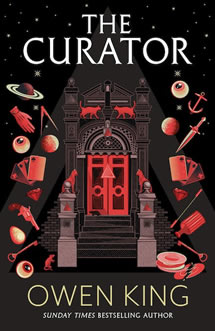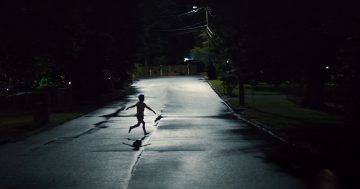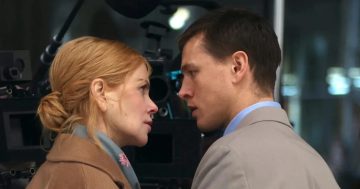Reviewed by Robert Goodman.
By Owen King, Hachette, $32.99.
 Stephen Kings boys – Owen King and Joe Hill – seem to have picked up a thing or two from their father but are also seeking to put their own stamp on modern fantasy and horror. Owen’s previous book Sleeping Beauties was a co-release with his father but with The Curator, King steps out from under that shadow and delivers something decidedly different and unique. While it has some fantasy and horror stylings, The Curator fits better in the New Weird style, championed by authors like China Mieville and Jeff Van de Meer.
Stephen Kings boys – Owen King and Joe Hill – seem to have picked up a thing or two from their father but are also seeking to put their own stamp on modern fantasy and horror. Owen’s previous book Sleeping Beauties was a co-release with his father but with The Curator, King steps out from under that shadow and delivers something decidedly different and unique. While it has some fantasy and horror stylings, The Curator fits better in the New Weird style, championed by authors like China Mieville and Jeff Van de Meer.
The action of The Curator takes place in a mythical European (or Europe adjacent, it is never really clear) city known as “the Fairest”. When the book opens, the city has been riven by revolution and is being ruled by a revolutionary council. Students and unionists wearing green armbands are helping restore order and keep the peace along side the Auxiliary forces who joined the side of the rebellion against the regular army. In the middle of this chaos is Dora, also known as D, a former maid who, through Robert, her student revolutionary boyfriend, ends up responsible for taking care of the Museum of the Worker, a five story building of fading waxwork exhibits displaying different types of occupations. D is there to try and find out what actually happened to her brother Ambrose, who died after becoming involved in the neighbouring Institute of Psykical Research, a building mostly destroyed in the fighting. In doing so she will uncover both a mystery and conspiracy as the city falls further into chaos.
The Curator is very much part of a fantasy sub-genre that focusses on cities and explores them from the top to the bottom. Daniel Abraham’s Age of Ash and Adrian Tchaikovsky’s The City of Last Chances are good recent examples of this trend. King’s narrative eye takes in not only Dora and Robert but a large range of characters from the guilded rooms of the revolutionaries to the street urchins who steal to get by and play a strange game involving dropping stones off one of the two city bridges, scoring points by hitting flotsam in the river. The middle of the book in particular feels made up of a mosaic of short stories centred on different characters but King never loses sight of the overall narrative and the way in which these stories contribute to it.
There are some unique, and decidedly idiosyncratic fantasy elements that drive some of the action in The Curator, reminding readers that this is Europe but not as we know it (the two moons are a dead giveaway). Cats play a big role in the belief systems of the city, the significance of the triangle as a symbol slowly becomes clearer. Given his horror antecedent, King does not shy away from violence and death. No one is safe in this narrative and the Morgue Ship where dead bodies are put on display to the public (based on a trues story according to a note at the end of the book), plays an increasingly large role in the action as the violence escalates.
Owen King clearly demonstrates a unique fantasy voice in The Curator. The story has steampunk stylings, a cracked fairytale feel but also a modern, critical political edge to it. The characters are all slightly odd and expand out from any stereotype that they might start out as (bar owner, street urchin, student revolutionary). The main characters in particular are endearing and King makes readers care about them as their existence becomes increasingly tenuous. Overall, for those who like their fantasy modern, challenging and a little weird, King delivers.











